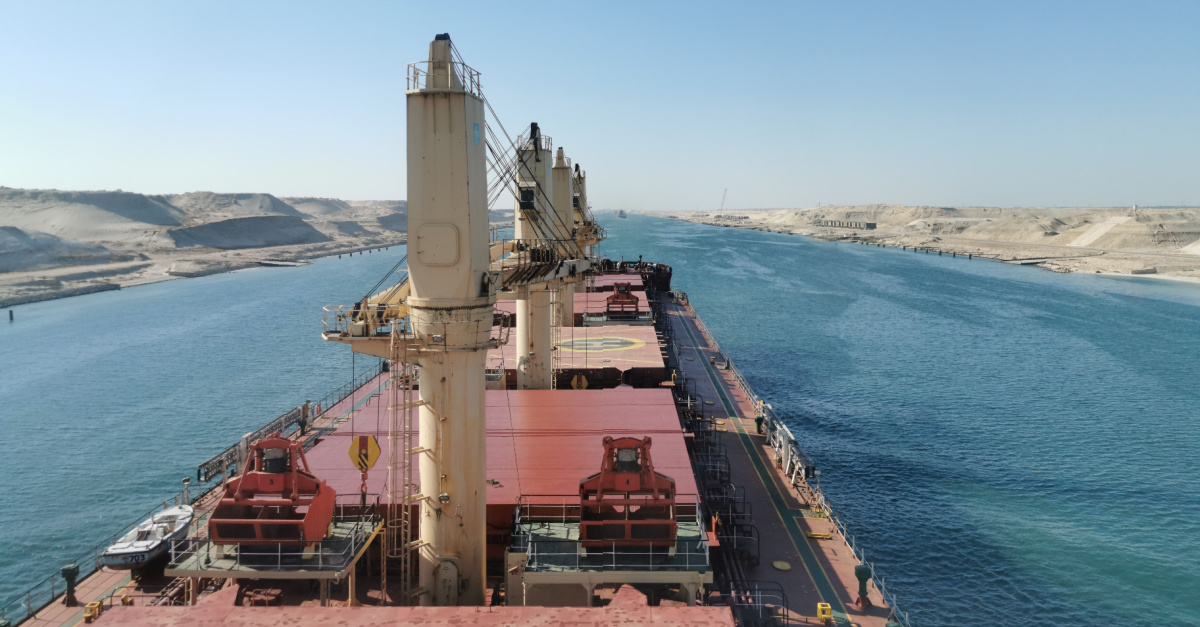
In an era marked by unprecedented challenges in maritime transportation, the escalating crisis in the Red Sea has sent shockwaves through the global shipping industry. Shippers and carriers are grappling with the far-reaching impacts of security risks and recurring closures of the Suez Canal, which have significantly disrupted established trade routes and heightened logistical complexities.
Major players in the shipping industry have temporarily suspended Suez transits. Weekly container ship transits have plummeted by 67%, according to a report. As the world faces this disruption, the importance of reliable shipping solutions cannot be overstated. The need for stability in the face of uncertainty has never been more critical for shippers looking to build resilience and mitigate fallout from the crisis in the Red Sea. The constant threat of disruptions and increased costs necessitates a steadfast approach to maritime logistics.
In this time of struggle, where supply chains are tested, solutions like Gemini Shippers help carriers and shippers find a partner committed to providing stability to its members. Gemini’s procurement experts can help you secure fixed-rate ocean and intermodal contracts with global carriers, providing optimal solutions tailored to individual member needs. Unlike traditional freight forwarders, new-age solutions like Gemini ensure that members maintain complete visibility and transparency of the direct carrier relationship, both at the origin and destination.
This article examines the pressing need for reliability in the face of the Red Sea crisis and how shippers can address logistical challenges, mitigate costs, and leverage innovative solutions. In a volatile industry, partners like Gemini are poised to collaborate with shippers and carriers, recognizing the vulnerability of global supply chains.
The Red Sea Crisis: An Overview
The Red Sea crisis has cast a shadow over the maritime landscape, fueled by escalating security risks and geopolitical tensions in the region. The strategic importance of the Red Sea, connecting Europe, Asia, and Africa, has made it a focal point of global trade. However, the region’s volatility has reached alarming levels, posing severe threats to the security of vessels navigating its waters.
Compounding the challenges, the Suez Canal — the lifeline of global shipping — has experienced repeated closures due to the looming threat of attacks. The Suez Canal handled approximately 12% to 15% of international trade in 2023. UNCTAD estimates that the trade volume going through the Suez Canal decreased by 42% over the last two months due to the disturbances in the Red Sea and resulting disruptions.
These disruptions have paralyzed one of the world’s busiest maritime routes, triggering a domino effect on international trade. As the threat of closures persists, shippers and carriers navigate uncharted waters, with each shutdown amplifying the complexity and unpredictability of the supply chain.
The impact of these challenges extends beyond the immediate disruptions, influencing global trade dynamics and forcing stakeholders to reassess their strategies. Shippers, in particular, are grappling with shifting dynamics, adjusting to a new normal where reliability is paramount and agility is the key to survival.
In the face of these unprecedented challenges, shippers are confronted with the imperative to adapt to a rapidly evolving landscape. The shifting dynamics demand a paradigm shift in how shippers approach logistics and supply chain management. In the next section, we delve into the ramifications of the crisis, exploring how shippers are navigating this turbulent terrain and the pivotal role reliability plays in their strategies.
As the Crisis Worsens, Shippers Face Shifting Dynamics
As the Red Sea crisis intensifies, shipping companies are confronted with a host of challenges that demand strategic adaptation. Houthi rebels targeting vessels in the region have led to a heightened sense of insecurity, prompting shipping companies to reconsider their routes and adopt strategic rerouting measures. The complex logistical challenges arising from these security threats have forced companies to develop adaptive strategies focusing on ensuring the safety of their cargo and vessels.
Moreover, the crisis has not only disrupted the physical movement of goods but has also given rise to a surge in shipping costs. Since early December, the average container shipping spot rates from Shanghai have more than doubled (+122%). More specifically, the rates from Shanghai to Europe have more than tripled (+256%), while rates to the west coast of the United States increased by 162%, although ships on this route do not go through the Suez Canal.
Meanwhile, the increased risks and uncertainties in the Red Sea region have led carriers to impose temporary surcharges to offset the elevated expenses associated with securing maritime routes. While necessary for the industry’s short-term survival, these surcharges have further compounded the financial burden on shippers already grappling with the fallout of disruptions.
The broader economic implications of the crisis reverberate across the global supply chain, emphasizing the interconnectedness of the maritime industry with the wider economy. Shippers, facing unprecedented challenges in the Red Sea region, are pressed to adapt swiftly to the industry’s shifting dynamics.
Navigating the storm of uncertainties, shippers find themselves at a crossroads where reliability becomes the linchpin of their operations. In the next section, we explore the pivotal role reliability plays in mitigating the impacts of the crisis, safeguarding vessels, and proposing innovative solutions in a volatile industry where adaptability is paramount.
In a Volatile Industry, Shippers Require Reliability
In the Red Sea crisis turbulence, reliability emerges as the anchor stabilizing shippers amid uncertainty. Within this challenging context, services like Gemini Shippers are pivotal in providing a stable and secure shipping environment.
- Competitive Fixed Rate Pricing: Gemini’s procurement experts secure fixed-rate ocean and intermodal contracts with over 14 global carriers, offering stable pricing that shields members from the fluctuations caused by the crisis.
- Transparent Direct Carrier Relationships: Unlike traditional NVOCCs or freight forwarders, Gemini members maintain complete visibility and transparency of their direct carrier relationships, both at origin and destination, enhancing control and trust.
- Auditing for Rate Accuracy: Gemini conducts thorough audits of bills of lading moving under their contracts, ensuring rate accuracy and protecting members from unforeseen financial discrepancies.
- Innovative Solutions for Logistical Challenges: Facing complex logistical challenges arising from the Red Sea crisis, Gemini is committed to providing innovative solutions. Leveraging strategic partnerships with logistics solution providers such as GT Nexus and Vizion Logistics, Gemini expands its service offerings to meet the evolving needs of its members.
- Proprietary Member Web Portal: Gemini offers members access to a proprietary web portal, enhancing communication, information sharing, and real-time tracking capabilities for increased operational efficiency.
- Expert Team Across the Supply Chain: Gemini’s transportation professionals, with extensive experience in import logistics, procurement, pricing, customs brokerage, international trade, and supply chain management, ensure a comprehensive and adept approach to addressing the multifaceted challenges the crisis poses.
Gemini’s commitment to reliability extends beyond conventional practices, fostering a stable environment for its members amid the uncertainties of the Red Sea crisis. Safeguarding vessels and shipments, Gemini remains at the forefront of the industry, adapting and innovating to address the evolving landscape.
When the industry demands unwavering reliability, this reliability goes beyond mere service provision – it becomes a commitment to stability in an inherently unstable environment. As shippers and carriers seek a reliable partner, the importance of collaboration becomes increasingly evident, laying the foundation for the upcoming exploration of why collaboration is critical in this crisis.
Collaboration is Key In a Moment of Crisis
In a moment of crisis, such as the Red Sea upheaval, collaboration becomes the linchpin for the resilience and sustainability of global supply chains. Recognizing the vulnerability of these intricate networks to geopolitical tensions, stakeholders across the shipping industry are realizing the importance of collective efforts to navigate the complexities posed by the Red Sea crisis.
Geopolitical tensions, particularly in strategically significant regions like the Red Sea, expose the vulnerability of global supply chains. The interconnected nature of international trade means that disruptions in one part of the world can reverberate across the entire network, impacting businesses, consumers, and economies. Shippers and carriers are now acutely aware of the need for a unified and collaborative approach to fortify the resilience of these vital arteries of commerce.
In the face of such a crisis, characterized by security risks and Suez Canal closures, collaborative efforts take center stage. Shippers, carriers, and logistics solution providers must unite to share insights, pool resources, and develop agile strategies that can adapt to the evolving challenges. By fostering a spirit of collaboration, the industry can better address the immediate disruptions and work towards long-term solutions to fortify global trade routes.
At Gemini Shippers, we recognize the broader implications of the Red Sea crisis and reaffirm our commitment to supporting both its members and the industry as a whole. As a reliable partner, Gemini stands ready to collaborate with stakeholders, leveraging its expertise, strategic partnerships, and innovative solutions to navigate the complexities posed by the crisis.
Whether through the procurement of stable fixed-rate contracts, transparent direct carrier relationships, or innovative logistical solutions, Gemini demonstrates a commitment to stability and reliability. By fostering collaboration among its members and industry partners, Gemini aims to contribute to a collective effort that safeguards the integrity of global supply chains and ensures the continuous flow of goods even in turbulent times.
Navigating the Red Sea Crisis: A Call for Collective Resilience
Gemini addresses the challenges head-on in the face of the Red Sea crisis, where uncertainties loom large over global ship competitive fixed-rate pricing, transparent direct carrier relationships to innovative solutions, and a commitment to collaboration.
As the industry confronts geopolitical tensions, the call for collective resilience echoes. Shippers and carriers looking to weather the storm and emerge stronger should consider joining Gemini today, fortifying their supply chains with a partner committed to navigating the complexities and ensuring a secure and stable future.


